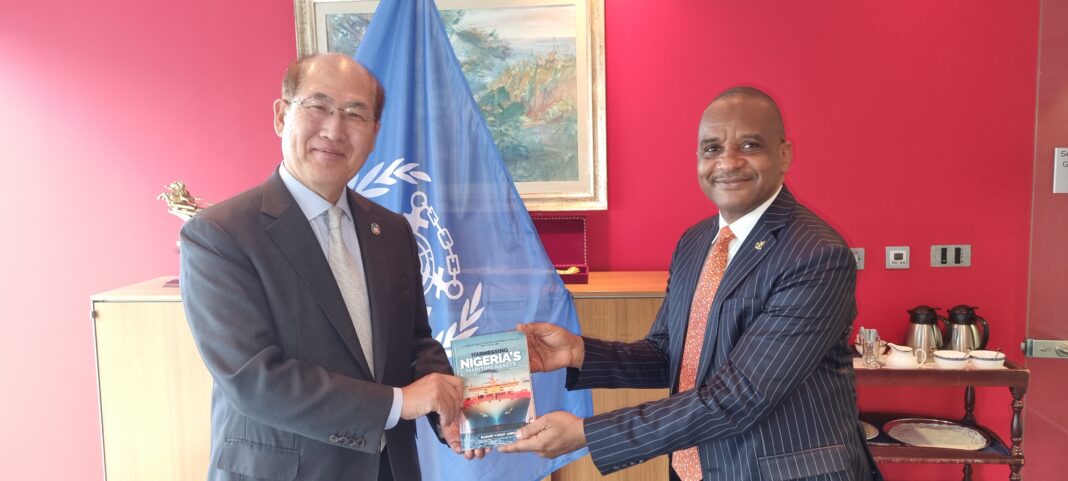Director-General of Nigeria Maritime Administration and Safety Agency (NIMASA) Dr Bashir Jamoh, has taken the campaign for the country to clinch a Category C seat on the Council of International Maritime Organisation (IMO) to the London headquarters of the body.
Jamoh, who sought and got an exclusive audience with the IMO Secretary-General, Kitack Lim, explained Nigeria’s preparedness to be elected alongside 39 other member countries of the organization into its main decision-making organ.
He explained that Nigeria, has in recent times, intensified efforts at ensuring improved maritime security, raising safety standards on Nigerian waters in line with IMO regulations, and achieving a pollution-free marine environment.
While giving a breakdown of noteworthy efforts by the Nigerian government to address problems of maritime piracy, sea robbery, and removal of wrecks for safe navigation, Jamoh told Lim that the country’s unwavering drive has resulted in a reduction in maritime crimes in the Gulf of Guinea and it’s Exclusive Economic Zone.
Making specific reference to the recent third-quarter International Maritime Bureau (IMB) report, Jamoh told the IMO SG that Nigerian waterways up to the Gulf of Guinea are presently having improved security.
On the IMB report, he said “The report says the Gulf of Guinea recorded 28 incidents of piracy and armed robbery in the first nine months of 2021, compared to 46 in the same period in 2020. What is of particular importance to us in the report is the fact that Nigeria reported only four incidents during the period, against 17 and 41 cases that were recorded in 2020 and 2018, respectively.
“The IMB report shows that crew kidnappings in the region during the period dropped to only one crew member, compared to 31 taken in five separate incidents in Q3 2020. It is quite remarkable that the only crew kidnapping case recorded during the period under review was against the vessel at the port of exchange, while the average successful kidnapping location during the same period in 2020 was approximately 100 nautical miles from the land” Jamoh said.
On marine environment protection, Jamoh disclosed to Lim that Nigeria has engaged marine litter marshals to monitor and ensure compliance with international standards.
He expressed appreciation to the IMO and other international partners for their support through various maritime safety and security initiatives while also pledging Nigeria’s commitment to maritime scholarly endeavours under the aegis of World Maritime University (WMU).
Last week, in Lisbon Portugal at the third Seminar of the Atlantic Center, Jamoh solicited the support of Nigeria’s friends to vote for the country into the council of IMO in the election that comes up as part of the organization’s 32nd General Assembly which comes up from December 6 to 15, 2021
He said: “We ask for your vote and count on your continued confidence in the efforts of Nigeria to work in partnership with other nation-states in the Gulf of Guinea to continue keeping our corridor of the Atlantic Ocean a safe passage for seafarers, their vessels, and the vital supplies they transport for our common sustenance”.
During the launch of the Deep Bue assets for maritime security by President Muhammadu Buhari in Lagos on June 10, 2021, the IMO secretary-general commended Jamoh and the Nigerian government for their commitment to enhancing maritime security in the Gulf of Guinea.
In a video message, Kitack Lim described the assets as a bold step by Nigeria in the fight against maritime insecurity while expressing optimism that it will yield positive results.
President Buhari approved that Nigeria contest for election into the council of the global maritime body. The Council is elected by the Assembly for two-year terms beginning after each regular session of the Assembly. It is the Executive Organ of IMO and is responsible, under the Assembly, for supervising the work of the Organization. Between sessions of the Assembly, the Council performs all the functions of the Assembly, except the function of making recommendations to Governments on maritime safety and pollution prevention which is reserved for the Assembly by Article 15(j) of the Convention.
Other functions of the Council are to:
coordinate the activities of the organs of the Organization;consider the draft work programme and budget estimates of the Organization and submit them to the Assembly;receive reports and proposals of the Committees and other organs and submit them to the Assembly and Member States, with comments and recommendations as appropriate;appoint the Secretary-General, subject to the approval of the Assembly;enter into agreements or arrangements concerning the relationship of the Organization with other organizations, subject to approval by the Assembly


